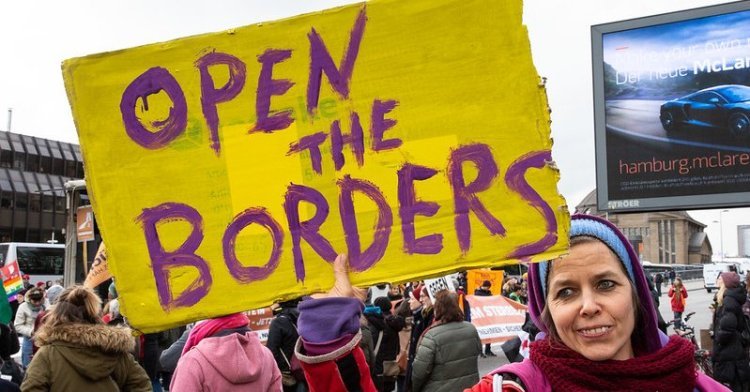What’s currently happening on the Greek-Turkish border?
On the 29th February, the Turkish President Recep Tayyip Erdogan declared the border between Turkey and Greece open. Greece and the EU see things differently: they continue to defend the border and reinforce the security forces deployed there. Numerous refugees who were in Turkey made their way there after Erdogan’s announced opening and hope to now finally travel further to Europe. However, because they can’t get across the border, they’re waiting there. The International Organisation for Migration estimates there to be at least 13,000 of them. Meanwhile, some of them are going back to bring their children to safety, for example. However, they are equally confronted by discrimination and hatred of foreigners in Turkey.
For a long time there has been an escalation of extreme rioting on the border. The Greek border guards have deployed, for example, stun grenades and riot sticks. Moreover, tear gas and clouds of smoke were dispersed with large fans. On the other side, it is being reported that stones, incendiary material and other objects are being thrown at security forces in an attempt to cross the border. A video was played to the Greek broadcaster Skai in which a Turkish tank tries to pull down the border by force in order to open the way to Greece.
Meanwhile allegations and reports are surging around the internet which cannot be accurately verified. On the Turkish side, Greece is accused of having shot at refugees. Greece refutes this. The American New York Times reports secret prisons in restricted military areas, in which Greece is allegedly detaining, torturing and robbing migrants. These newspapers are referring to reports from eyewitnesses. According to Greece, this is disinformation i.e. so-called ‘fake news’ in the form of Turkish propaganda.
Why did Turkey open the border?
Erdogan had threatened to open the border many times before. One of the reasons is presumably the past EU budget negotiations in which funds to further support Turkey were not agreed. Opening the border could put the EU under pressure. In 2016, the EU and Turkey made a deal which envisaged that the EU would support Turkey with up to €6 billion as Turkey had accepted around 3.6 million refugees, primarily from Syria. Turkey was to look after the refugees and thereby stop them travelling on further to Europe. The money didn’t go directly to the Turkish government, but was amongst other things paid in part to relief organisations locally. Erdogan claims to have never received the money and that it’s also not enough. Furthermore, the deal entailed that it should be made easier for Turkish citizens to apply for a Schengen Visa with which they can travel in EU countries, and that the customs union between Turkey and the EU should be updated. Thus far, that hasn’t happened.
In addition, Turkey is increasingly coming into difficulty because of the military conflicts in Idlib. Idlib is a province in Northern Syria and borders directly on Turkey. There is currently heavy fighting there between the rebels supported by Turkey and Syrian government troops supported by Russia. The military escalation recently drove many people to flee once again. A ceasefire was actually agreed between Turkey and Russia. At first this was not adhered to, now Erdogan and the Russian president Vladimir Putin have appeared more unified than before. Turkish troops remain nevertheless in the field and according to Erdogan are ready to react to any potential violations of the ceasefire. Therefore, Turkey is under enormous pressure, has already called on NATO many times for as of yet absent support and is looking for support from Europe.
How did Greece react?
Greece doesn’t want to let any refugees over its borders and is increasingly reinforcing the police forces deployed at the border. Media reports show how tear gas and stun grenades were deployed to stop people crossing the border. But if they succeeded, they were arrested and some of them were sentenced to imprisonment. They did not have an entitlement to a defence lawyer.
At the same time, the situation is escalating on the Greek island Lesbos and the refugee camps there, Moria and Kara Tepe. Moria was built for a few thousand people. Today 22,000-25,000 refugees, of whom 8,000 are children, live there. There are too few sanitary facilities and the accommodation is not suitable for the low temperatures. In addition, self-described, mostly right-wing militias are patrolling there. According to surveys, the majority of the Greeks support the hard-line of the government.
How did the EU react?
President of the European Commission Ursula von der Leyen confirmed that Greek borders are also European borders. Initially, the border protection organisation Frontex sent help and its deployed employees have now been further reinforced. Amongst them there are Austrian and Cypriot as well as Polish and Czech officials who’ll close off the border. Von der Leyen also approved €700 million emergency aid. Greece, however, feels abandoned, as the EU cannot reach a consensus on how asylum seekers should be distributed and thereby abandons Greece and its overcrowded camps. Commission President Ursula von der Leyen thanked Greece meanwhile for being a protective shield on the EU’s external border.
On the 17th March 2020, Erdogan will meet with Angela Merkel and Emmanuel Macron. The British Prime Minister is also invited. What exactly will be discussed is still unknown; supposedly it should be about the deal between Turkey and the EU and as well as the situation in the country in civil war, Syria. Merkel additionally meeting with the Greek Prime Minister Kyriakos Mitsotakis in Brussels is being interpreted by many as German solidarity with Greece. Erdogan had already met beforehand with Von der Leyen and Charles Michel, President of the European Council, to discuss the EU-Turkey Deal. The outcomes of the discussions are not yet obvious.
Seven EU countries, including Germany, have meanwhile agreed to take in a total of 1,600 unaccompanied minors and other particularly vulnerable refugees from Greek camps. However at the same time this is only a fraction of the people stranded there. Moreover, the EU wants to pay money to refugees who voluntarily go back. Further support is planned but this will only be decided for definite at a conference in May.
What are human rights organisations calling for?
Human rights organisations such as Amnesty International criticise the events very strongly. They criticise Erdogan for using human life as leverage in a political conflict. At the same time some voices, such as the Danish Social Democrat Kati Piri, point out that Erdogan’s behaviour is only a reaction to the failure of the EU, which doesn’t honour its part of the deal agreed. Piri assumes that the EU foresaw this failure and thereby accepted Erdogan’s behaviour and such escalations in order to keep the refugees in the short-term in Turkey and thus outside of the EU in 2016.
Furthermore, Greece is criticised for deploying, among other things, tear gas, stun grenades and riot sticks. The organisation Human Rights Watch describes it moreover as “inhumane and illegal” that Greece refuses those seeking protection the possibility of applying for asylum; the country decided to not process any new applications for a month. According to the UN Refugee Agency (UNHCR), arresting refugees that make it to Greece also means that families are ripped apart, if for example only the father is arrested but other family members are brought to a refugee camp. The inhumane conditions in which refugees are housed are also denounced. For example, Human Rights Watch was refused admittance to a ship which has over 450 migrants on board. The organisation sees this as Greece’s attempt to cover up crimes against international law and violations of human rights.
The EU is under fire, on the one hand because no consensus can be reached on the question of the Europe-wide distribution of refugees and thus can’t provide support for Greece. On the other hand, it hasn’t yet criticised the events on the Greek-Turkish border. Whilst the EU likes to describe itself as a bringer of peace, it has not so far afforded the destitute people on the Greek-Turkish border any protection. Von der Leyen confirmed in addition that there will be no opening of the border.



Follow the comments: |
|
